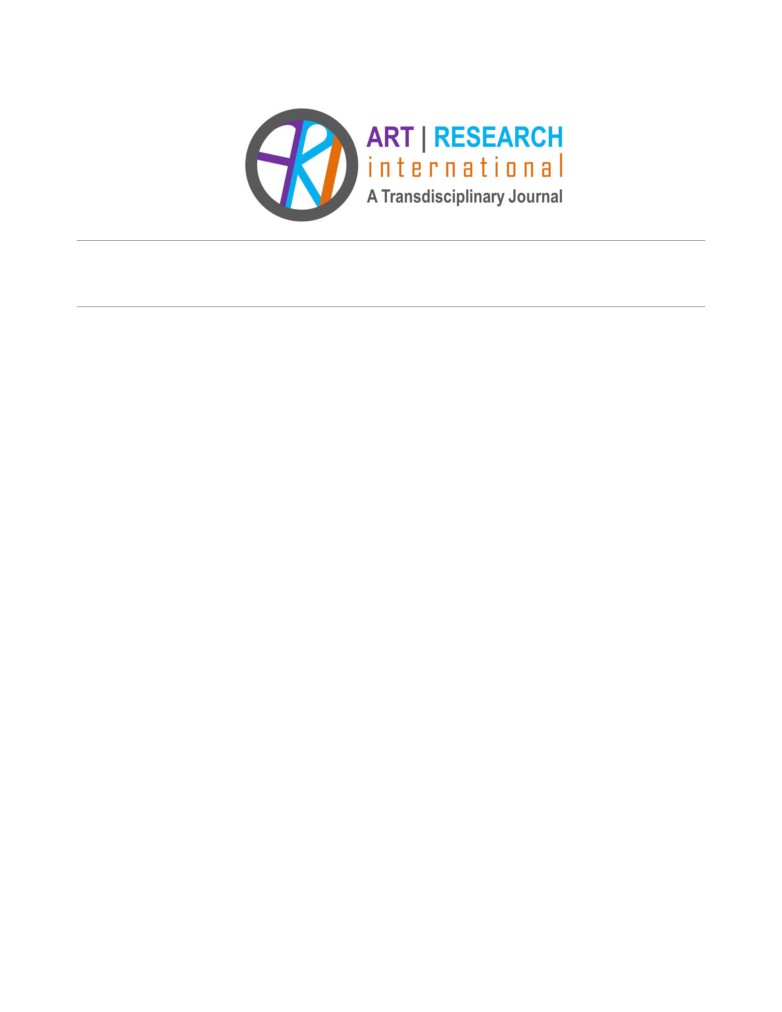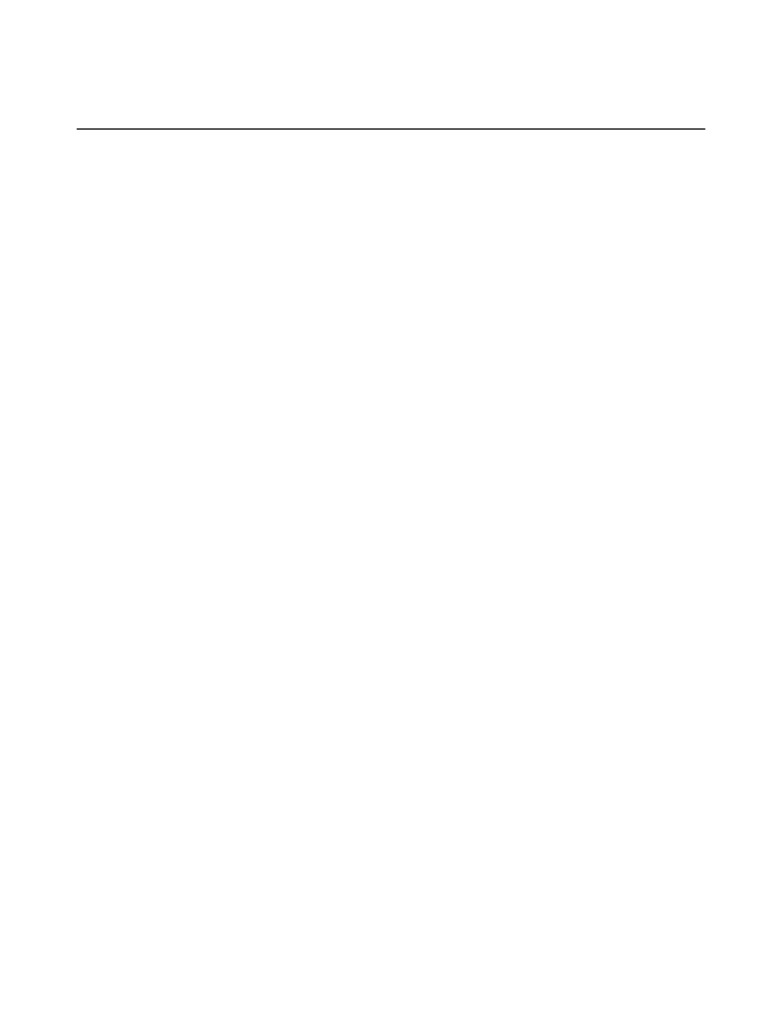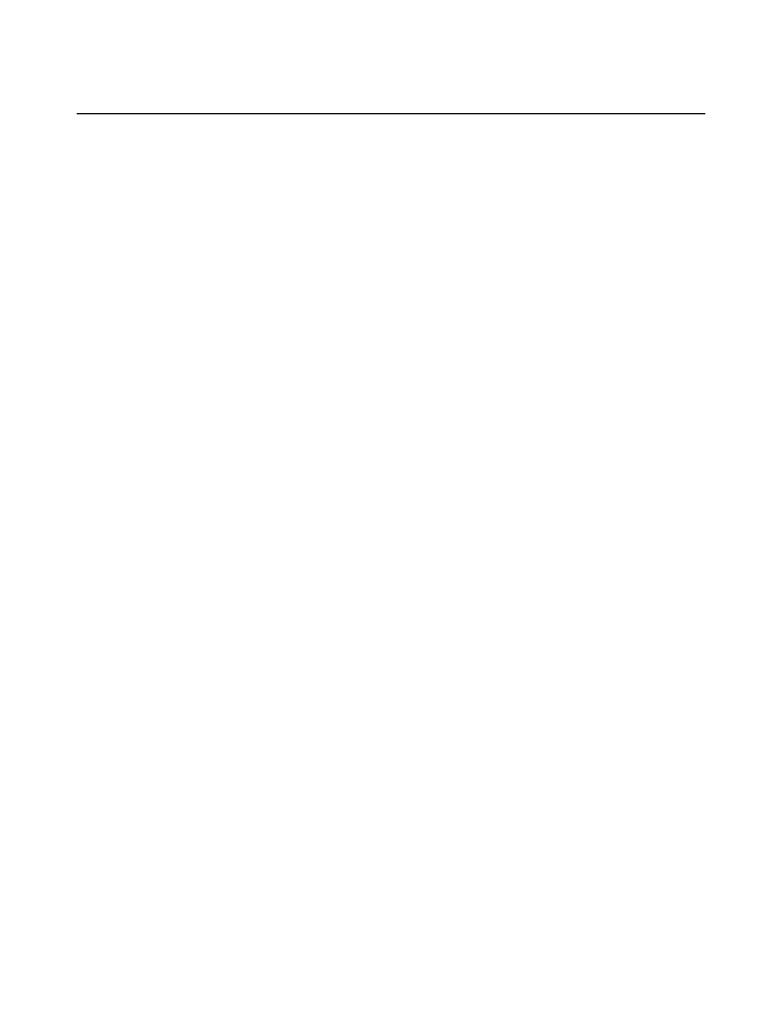Art/Research International: A Transdisciplinary Journal
Volume 2 Issue 1
“IT’S A TRASH”: POETIC RESPONSES TO THE
EXPERIENCES OF A MEXICAN EGG DONOR
Heather Walmsley
University of British Columbia
Susan M. Cox
University of British Columbia
Carl Leggo
University of British Columbia
Heather Walmsley is a qualitative health researcher whose work entwines the literary arts with
bioethics, political theory, and anthropology to examine societal and ethical transformations of
emerging health technologies. Heather was a SSHRC Banting Postdoctoral Fellow at the University
of British Columbia from 2012-14. She is a graduate of the 2016 Writers Studio at Simon Fraser
University and her poetry is published in the anthology Emerge 16.
Susan Cox is a qualitative researcher and ethicist working in health research and interdisciplinary
studies. Her work on the use of the arts in health research aims to open up new ways of co-creating
and mediating our understandings and experiences of health and contemporary social life.
Carl Leggo is a poet and professor at the University of British Columbia. His books include:
Lifewriting and Literary Métissage as an Ethos for Our Times (co-authored with Erika Hasebe-Ludt
and Cynthia Chambers); Poetic Inquiry: Vibrant Voices in the Social Sciences (co-edited with Monica
Prendergast and Pauline Sameshima); and Sailing in a Concrete Boat: A Teacher’s Journey.
“It’s a Trash:” Poetic Responses to the Experiences of a Mexican
Egg Donor
58
Art/Research International: A Transdisciplinary Journal
Volume 2 Issue 1
ABSTRACT: This paper explores the use of found poetry as interpretive and aesthetic inquiry into
the meaning and experience of reproductive tourism. The context is an ethnographic study of
transnational egg donation, focusing upon the fertility services industry in Cancun, Mexico. Our
source is an audio-recorded interview conducted with Maria, a young Mexican woman who struggles
to maintain her integrity as a single mother donating eggs to a fertility clinic. Drawing upon Maria’s
story, we experiment with three forms of found poetry as a method for listening deeply to her voice. In
this paper, we share our research process, poems, and reflections.
KEYWORDS: poetic inquiry; reproductive tourism; qualitative research; found poetry; egg donation;
infertility
“It’s a Trash:” Poetic Responses to the Experiences of a Mexican
Egg Donor
59
Art/Research International: A Transdisciplinary Journal
Volume 2 Issue 1
What can poetry contribute to the understanding and evocation of the ethics
of a burgeoning multi-billion dollar international reproductive tourism industry? This
question inspires this collaboration in poetic inquiry. We write as three poet-
researchers - Heather Walmsley, Susan Cox, and Carl Leggo. Our methodology
braids together contrasting personal and scholarly backgrounds with the thread of a
common conviction: that poetry is a way of “opening
knowing,” a “fierce kind of inquiry” (Stewart, 2012,
“What can poetry
pp. 116-117).
contribute to the
Reproductive tourism refers to the movement
understanding and
of patients between nations in search of eggs and
evocation of the
sperm, fertility services, and surrogate bodies. Often,
such patients travel to take advantage of legislative,
ethics of a
cultural, ethical, and cost of living and/or price
burgeoning multi-
disparities between jurisdictions. Critics have framed
this phenomenon dramatically - as a “reproductive
billion dollar
brothel” (Cherry, 2014) or “moral pluralism in motion”
international
(Pennings, 2002). In Canada the Assisted Human
Reproduction Act
(AHRA) has prohibited the
reproductive
purchase of eggs and surrogacy services since
tourism industry?”
2004, on ethical grounds (Downie & Baylis, 2013).
The resulting scarcity of eggs and surrogates, and
the cost of treatments, has driven many Canadians
to fertility clinics in Cancun,
Mexico (Schurr & Walmsley, 2014).
In January
2014, Heather travelled to Cancun and conducted in-depth
interviews with clinicians, medical tourism agents, reproductive travellers, and egg
donors. One driving question was whether Canadian law effectively exports the
commodification of children, exploitation of women, and associated assaults on
human dignity to the poor and vulnerable overseas. Within a void of empirical
evidence, she sought the “actual stories, desires, and migratory pathways” (Inhorn,
2011, p. 88) of egg donors and recipients. This research obtained ethics approval
from the Behavioral Research Ethics Board, University of British Columbia.1
Participant consent forms explained that analysis would involve creating poetry from
interview transcripts, as part of an arts-based research methodology.2
This paper centers upon one of these interviews conducted with a young
Mexican egg donor one evening after work in a park in Cancun. Although this
interview has been transcribed, we chose to work only with the audio recording of the
interview and not the written text. Each of us listened carefully to the audio recording
“It’s a Trash:” Poetic Responses to the Experiences of a Mexican
Egg Donor
60
Art/Research International: A Transdisciplinary Journal
Volume 2 Issue 1
and wrote three found poems, according to the distinct formal requirements below,
and in the order presented below. We also composed commentaries - reflecting on
our poetic intentions, form, and process, and circulated responses to each other’s
work. We originally developed this collaborative writing process using “data” from an
online infertility discussion forum (Walmsley, Cox, & Leggo, 2015).
Poetic forms
The three forms of found poetry we used are described below:
1. Found poetry - Erasure poetry. Take one text and black out words and/or
letters, creating a poem from the remaining words and phrases (which must remain in
order). It is possible to create new words by fusing two words after erasing letters, but
letters must remain in the order they appeared. The researcher-poet has freedom
regarding punctuation and layout. Given our use of audio rather than written texts,
this process became a process of selecting and recording phrases that resonated
(the words remaining in their original order), and effectively “erasing” what did not.
2. Found poetry - Free-form excerpting and remixing. Excerpt words and
phrases from source text(s) and rearrange them in any manner you choose to form a
poem. Again the researcher-poet has freedom regarding punctuation and layout.
3. Found poetry? Or not? Total poetic freedom. Write a poem about
anything inspired by the data and stimulus, the research process, or the writing
process.
Strands of Inquiry
Heather. “Poetry is a break for freedom,” writes poet and philosopher David
Whyte (2017), “The discipline of poetry is in overhearing yourself say difficult truths
from which it is impossible to retreat.” My intention in this work of collaborative poetic
inquiry is threefold. I wish to use poetry to listen to the difficult truths of the
reproductive tourism industry from the perspectives of differentially located
participants. These truths unsettle debates raging within bioethics and policy on the
commodification of the body and compensation for donor gametes; they unsettle
understandings of reproductive tourism and female agency; they disrupt my own
understandings of motherhood.
I also wish to use poetry as a way of hearing differently - of hearing subtler
shades of experience than those emerging from thematic or narrative interview
“It’s a Trash:” Poetic Responses to the Experiences of a Mexican
Egg Donor
61
Art/Research International: A Transdisciplinary Journal
Volume 2 Issue 1
analysis. This hearing involves careful attention to my own cognitive and affective
responses. It is enriched through careful attention to the responses of Susan and
Carl, to similarities and differences, and how I relate to them.
Finally, I hope to use poetry to write “difficult truths,” with greater clarity and
impact. A lover of literature, working in sociology, I am driven to craft a “poetic social
science” that moves both heart and head
(Bochner,
2000). I am inspired that
neuroscience now acknowledges poetry as an integrator of linear left-brain activity
with somatic, visual, emotional right-brain activity. “The imagery and sensations of
poetry,” writes Siegel (2007), psychiatrist and pioneer of interpersonal neurobiology,
burst
“our cognitive conceptions at their roots
… give birth to a new way of
knowing” (p. 162).
Susan. The practice of poetic inquiry offers a gorgeous opening to anyone who
longs to explore creative approaches to meaning-making in qualitative research. As a
sociologist, ethicist, and health researcher who early on made what she thought was
a pragmatic choice to study biology rather than creative writing, I have in some ways
come full circle through the life sciences, social sciences, and humanities. This is no
claim to mastery of any sort but rather a shorthand way of saying that I mostly live in
the interstices, never quite comfortable within any one culture of knowing.
As a qualitative researcher constantly in search of more authentic,
aesthetically satisfying and deeply ethical approaches to understanding experiences
of health, illness and the body, I find in poetic inquiry the opportunity to listen
differently, to become more acutely aware of how I listen and of how I represent what
I hear. Following Glesne’s (1997) reflections on
“Poetic inquiry is to
poetic transcription, I seek some middle ground
me like a crackling between “the ‘small t’ truth of description” that is
the representation of an interviewee’s experience
fire that invites you
as filtered by the researcher, and “the large ‘T’
to rub your hands truth of seeing,” as Paz (1995) writes, “with the
eyes of the spirit” (p. 213).
together and then
spread them wide,
Poetic inquiry is to me like a crackling fire
turning your palms that invites you to rub your hands together and
then spread them wide, turning your palms
toward the flames
toward the flames so you might not just become
so you might not warm again, but your blood might fill with a kind of
elemental energy that flows from hands to heart
just become warm
and then to head. This flow of energy counters
again…”
dualistic ways of thinking about the body and
“It’s a Trash:” Poetic Responses to the Experiences of a Mexican
Egg Donor
62
Art/Research International: A Transdisciplinary Journal
Volume 2 Issue 1
mind, reaffirming that insight and understanding arise as much from sensory
experience, emotion, intuition, and imagination as they do from logic or cognition.
Carl. All my emotions and experiences, all my hopes and desires, are steeped
in poetry. I live in poetry, and poetry lives in me. I recognize with Adrienne Rich (1993)
that “a poem can’t free us from the struggle for existence, but it can uncover desires
and appetites buried under the accumulating emergencies of our lives” (pp. 12-13).
Like Rich, I know that a poem is “not a philosophical or psychological blueprint; it’s an
instrument for embodied experience” (p. 13). A poem is a way of living with an
imaginative and expansive devotion to one’s own experiences as well as the
experiences of others. In writing poetry, poets learn about themselves in relation to
others. The pronouns I and you connect in the richness of communication and
communion.
I engage in poetic inquiry because I am committed to infusing social sciences
and health sciences research with the disciplinary goals of the humanities, especially
literature and creative writing. I applaud Jean-Luc Nancy’s (2006) understanding that
“poetry is at ease with the difficult, the absolutely difficult” (p. 4). I embrace difficulty,
especially the tangled and complex questions of how we live in a cosmopolitan world
full of injustice and crisis and fear. I support Nancy’s claim that “poetry must be taken
into account in everything we do and everything we think we must do, in our
arguments, our thinking, our prose, and our ‘art’ in general” (p. 15). Nancy promotes
“a polyphony at the heart of every voice” (p. 43). I seek to hear the polyphony in every
voice.
Erasure Poems
Money
Carl
I need money
I did it because of the money
I really need the money
if you get less eggs they pay
less money the only word
I can say about the money
“It’s a Trash:” Poetic Responses to the Experiences of a Mexican
Egg Donor
63
Art/Research International: A Transdisciplinary Journal
Volume 2 Issue 1
it’s trash
I need the money
I didn’t want to because it’s so
bad money I want more money
I spent the money the next day
all the money was for them
everything was for the school
I never do something for me
I want to have more boobs
the money, everything is for
the school
single mom
you think about what you do
with your body I don’t want to
it’s not good money
it’s like an experiment
it’s just money
you don’t have an idea how
much money they get with
my eggs a lot of money, a lot
I want a good life
two years maximum
I think I’m just going to do it
like everything
it’s money money
money money
Nothing
Heather
Another clinic, they
pay ten thousand pesos but
if you have less than
“It’s a Trash:” Poetic Responses to the Experiences of a Mexican
Egg Donor
64
Art/Research International: A Transdisciplinary Journal
Volume 2 Issue 1
ten eggs
they pay one thousand less
for each egg
it’s not legal it’s not legal it’s not legal
they do that
and they are woman.
***
Different fathers
don’t give a shit
don’t give money
nothing
nothing
nothing
zero
totally zero
totally zero.
***
The father of her, he disappeared
now he wants to see her
doesn’t want to give money
“low season,
low season,
low season”
so bullshit, fucking
hippy, never wants
to give money.
***
They call me again,
they want me to do it
now
“It’s a Trash:” Poetic Responses to the Experiences of a Mexican
Egg Donor
65
Art/Research International: A Transdisciplinary Journal
Volume 2 Issue 1
si, si, si,
they want me to do it
now
I need the money
I didn’t want to
it’s so bad money.
***
I say the truth -
I don’t want to get
menstruation
she said, “but Maria you
have to
we made the plan”
I don’t want to
I don’t want to
I don’t want to.
***
I’m not rewinding
I’m not retracting
I’m not irresponsible
I’m going to do it
I want to hold on
just a few, just
three or four days
I’m not a bad person
but they pay SO BAD.
“It’s a Trash:” Poetic Responses to the Experiences of a Mexican
Egg Donor
66
Art/Research International: A Transdisciplinary Journal
Volume 2 Issue 1
My Things
Susan
I was living here
right here in the corner
I was living with my ex boyfriend
and she was my neighbour
I had really a problem
before kind of what I am going to tell you
on December 21st she called me
Maria Maria please
I am going to Mexico City
give me a jacket
please please please
give me your jeans
please please please
I only have just one jeans of that colour
it is for my work
Please please don’t be like that
I am going to give it back
that was on December 1st
yesterday was January 27th
and she didn’t call
we crossed I think
I was out with my boyfriend
she’d go out and say well hi
she’d say you were out
I’d say please call
I don’t have my things!
one month ago and she is not giving my things
so I am like don’t talk to me
I have some things of her
so you know
I have the things
I washed them
I had the things prepared
my boyfriend said why don’t you
why you don’t go and ask for your things?
I said no I don’t have to go with her and ask for my things
she has education
she has to go
“It’s a Trash:” Poetic Responses to the Experiences of a Mexican
Egg Donor
67
Art/Research International: A Transdisciplinary Journal
Volume 2 Issue 1
she asked me to give her some things
so now I am like I keep my things
there is no more worry
God bless you
So let’s start….
Si si
it’s strange
she knows she has my things
she loves my things!
so it is, you keep your things
okay, si.
Carl’s commentary. In her poem “Nothing” Heather recreates the aural
dynamic of Maria’s speech. By focusing on Maria’s typical way of speaking where she
repeats many words and phrases three times, Heather not only evokes the story-
telling dynamic of Maria’s speech, but she also evokes the character of the story-
teller. Maria is vitally and vibrantly present in her speech. In many ways, Maria’s story
is a hard story to attend to - there is so much injustice, unfairness, and sadness in
the story. Heather’s poem represents the challenges of Maria’s life. On the other
hand, the whole interview also presents Maria as humorous and hopeful. There is
always more to the story than any single poem can hold or evoke.
In a similar way, Susan conjures the character of Maria as complex, even
paradoxically tension-filled in her poem “My Things.” Maria is poor and generous; she
is hopeful and hopeless; she is gregarious and
“A poem works
protective. The poem is aptly titled - Maria’s life is
governed by the economic system of capitalism with
primarily with
its commitment to reciprocity, exchange,
babble and doodle -
remuneration, and mutual agreement. What Maria
has learned is that this arrangement often doesn’t
aural signifiers and
work very well. Susan’s poem evokes this tension by
visual signifiers.”
focusing on the momentousness of Maria’s
emotional responses to a friend’s borrowing and not
returning her clothes. A poem works primarily with babble and doodle
- aural
signifiers and visual signifiers. In “My Things” Susan evokes the rhythms of Maria’s
speech and story-telling by focusing on the graphic layout of the poem on the page.
In my poem “Money,” I collected the references to money that are sprinkled
throughout the interview, and I shaped them on the page in order to evoke a keen
sense of emotional turmoil. I am impressed by Maria’s honesty, humour, and
“It’s a Trash:” Poetic Responses to the Experiences of a Mexican
Egg Donor
68
Art/Research International: A Transdisciplinary Journal
Volume 2 Issue 1
humanity. While Maria’s stories are definitively hers, I also heard many resonances
with the stories of family and neighbours I grew up with in Newfoundland. In
significant ways, these are the stories of the economically underprivileged, the
working poor.
Susan’s commentary. Carl’s poem “Money” moves along with a strong
rhythm, contrasting Maria’s need for money to cover her children’s schooling with her
desire to have a good life. She says “I never do something for me” and has disdain for
how she must earn money to provide for her children. As a result, the money is trash.
Thus Maria forces us to think about the value of money in the context of how it is
earned as opposed to how it is spent.
In Heather’s poem “Nothing,” I hear Maria speaking very directly. I am grateful
that we were able to work from the audio-recording as I would never have grasped as
much from a written transcript. Like Heather, I am coming to appreciate how important
it is to hear the actual voices of those we are speaking through as we create this kind
of poetry. Staying close to their words is only part of the picture!
In creating “My Things,” I found the act of transcribing Maria’s interview very
intense. Such a breathless rush of words and so many forms of non-verbal but
audible communication. Two languages, and at least four voices; the sounds of a
park, children, wind, recording equipment, laughter, women talking, a child
interrupting. I felt as if I was almost there! As I started getting the words down, the
way they came out, the lovely accent so impossible to capture, I realized that Maria’s
story of lending a friend some nice clothes to go to the big city contains the essence
of a much deeper ethics that is fundamental to relationships between women and
what it might mean to be an egg donor. This is no mere story of a missing pair of
jeans, it concerns the responsibilities women have to one another and the importance
of mutual respect.
Heather’s commentary. Working from the audio changes everything. It
focuses and complicates issues of voice and authorship. I am struck by the focus of
established “found poetry” rules (which assume a written text) upon word order,
layout, and punctuation. Audio pulls my attention instead to speech patterns,
intonation, emphasis; it offers a strong sense of individual voice. Listening, I hear
Maria’s love of repetition, the way she repeats when she is animated: Si, si, si.
Please, please, please. Low season, low season, low season. In “Nothing,” I use this
speech pattern as a way into the analysis, as a way of hearing what is truly important
to Maria, and as the central organizing principle of the poem.
“It’s a Trash:” Poetic Responses to the Experiences of a Mexican
Egg Donor
69
Art/Research International: A Transdisciplinary Journal
Volume 2 Issue 1
I love Susan’s focus in “My Things.” I too was hit by the symbolic power of this
side-story about clothing that preoccupied Maria early in our interview. The poem
makes a powerful statement of outrage and injustice, of the respect that should be
accorded to things given - be they a pair of jeans or donor eggs. The lack of
punctuation and stanza breaks disorient at first, but they channel an authentic voice,
and the repetition eventually provides a rhythmic internal structure I did not anticipate
visually. The use of italics for speech gives a clear sense of the different voices,
appropriated by the narrator.
Carl’s play with spacing of words in “Money” intrigues me. The irregularity of
the pauses, the changing rhythm, the lack of stability until “money” repeats at the end;
they suggest Maria’s surging speech, her simultaneous bravado and fear, her
emotional turmoil. I enjoy the simple clear focus of this poem: how important money is
for a young single mother working hard whilst the bills never cease. It is an important
poem - for Maria, and for egg donors everywhere.
Free-form Excerpting and Remixing
My Eggs
Susan
I was living here
right here in the corner
I was living with my ex boyfriend
and she was not from my country
I had really a problem
with what I am going to tell you
on December 21st they called me
Maria Maria please
we have this woman here at the clinic from Atlantic City
give us an egg
please
give us two eggs
please please
give us all your eggs
please please please
I only have one, just one egg this month
it is for starting my family
Please please don’t be like that
you can have lots more
“It’s a Trash:” Poetic Responses to the Experiences of a Mexican
Egg Donor
70
Art/Research International: A Transdisciplinary Journal
Volume 2 Issue 1
you are like a rabbit
you can make lots more
that was on December 1st
yesterday was January 27th
they kept calling
wanting more
I was out with my boyfriend
the girl at the clinic
she’d say you were out
I’d say please don’t keep calling
I have given you my eggs
one month ago and you are not giving me enough money
so I am like don’t talk to me
I have some money from them
so you know
I have the money
not very much
my boyfriend said why don’t you
why you don’t go and ask for more for your eggs?
I said no I don’t have to go to them and ask for more
those women have education
they have money to travel
they have everything
and they ask me to give them my eggs
so now I am like I keep my eggs
there is no more worry
God bless you
I wonder if she knows she has my eggs
they love my eggs
so it is, I keep my eggs.
Si, no mas.
Teeter Totter
Carl
it’s so bad
in Mexico
it’s so sad
“It’s a Trash:” Poetic Responses to the Experiences of a Mexican
Egg Donor
71
Art/Research International: A Transdisciplinary Journal
Volume 2 Issue 1
it’s not legal
it’s not legal
it’s not legal
always always
it’s destruction
destruction
always the same
after the extraction
you feel like a balloon
you can’t
make pee
you can’t poo
nothing nothing
it’s nothing
zero totally zero
god bless you
but
bye bye
I have to be rude
if I’m not rude
I don’t like to be rude
the kids get you
crazy doesn’t matter
if you plan them or not
I’m very cool
I’m a cool mom
but they don’t know
I start feeling bad
about my body
to do that to my body
“It’s a Trash:” Poetic Responses to the Experiences of a Mexican
Egg Donor
72
Art/Research International: A Transdisciplinary Journal
Volume 2 Issue 1
the hormones I feel more like
how do you say
horny
my body I love
the way I am now
I really love it
I don’t want
I don’t want
I don’t want
they don’t want to pay me more
they don’t want to
they don’t want to pay more
no no no not a problem you don’t
have options no nothing
they just make the extraction
I just had four good ones
they were going to pay me 4000
four fucking thousand pesos
I go out of the hospital
I puked
I felt so bad
I was white white white
I felt so bad
they paid bad
they treat you
like an animal
disgusting it is nothing
a new clinic that pays more
it’s on Facebook
going to get so many women
“It’s a Trash:” Poetic Responses to the Experiences of a Mexican
Egg Donor
73
Art/Research International: A Transdisciplinary Journal
Volume 2 Issue 1
It’s a Trash
Heather
I need the money
I pay
everything
school
rent
food
light
toys
everything
every each
problem
my problem
Christmas
birthdays
everything
spend spend spend
my eggs are
very fertile
they call me a lot
I already made it like
five times
they tell me
my eggs are very fertile
but they pay
so bad
it’s a trash
it’s the only word
8,000 pesos
it’s a trash
like
an animal
one time one egg
swallow all the medicine
they don’t pay
disgusting
like the animal
so
uncomfortable
every day inject yourself
two injections
maybe three
“It’s a Trash:” Poetic Responses to the Experiences of a Mexican
Egg Donor
74
Art/Research International: A Transdisciplinary Journal
Volume 2 Issue 1
injections
anesthesia
surgery
last time I did it
these girls they told me
hey Maria we have
just four good eggs
four good ones
four fucking thousand pesos!
they don’t do it well
a headache
bleugh I puke
white white white.
I felt so bad
I was mad
I spent the money next day
all the money
for school of them
the fucking school
twenty thousand pesos
school
rent
I want
to have more boobs
I never do it
for vacation
something for me
everything
for school
school school school
was eating me
it’s so
bad paid in Mexico!
pffff
it’s a trash
the owners don’t care
don’t want to pay
it’s so sad
it’s a trash
“It’s a Trash:” Poetic Responses to the Experiences of a Mexican
Egg Donor
75
Art/Research International: A Transdisciplinary Journal
Volume 2 Issue 1
Susan’s commentary. In “It’s a Trash,” Heather respectfully examines Maria’s
ethos around egg donation. Maria wants it to be clear that she is not doing this for
herself. She donates eggs to pay school, rent, food, light, toys. She is a single mother
and as soon as the money is made, it is spent. She is on a treadmill and cannot get
off. The gravity of her situation and the impossibility of improving her life through egg
donation is thus at the heart of her assertion that the money is trash.
Carl’s poem “Teeter Totter” is playful in showing visually how Maria will adopt
one position and then its opposite. She literally teeter totters back and forth as we see
her thinking, her decision-making, her living come to life in this crazy attempt to find
some balance. The ultimate insight comes toward the last third of the poem when we
see that despite a miserable experience with egg donation, Maria is already holding
out hope for the next clinic being different, more humane, and perhaps more willing to
pay her enough to suffer through this again. This is very sad and yet also such a
tribute to resilience and the ways that people who have little choice continue to make
their difficult lives into something livable. Might it be that through listening deeply to
Maria’s story, the researcher somehow
contributes to the possibility of making
things ever so slightly better?
“Might it be that through
In creating “My Eggs,” I wondered if
listening deeply to Maria’s
my previous erasure poem (“My Things”)
story, the researcher
could literally be turned into a poem in
which, as I imagined, the clothes were a
somehow contributes to
metaphor for Maria’s eggs. My challenge
the possibility of making
was to see how few words and phrases
could be changed so that this new poem still
things ever so slightly
made sense. Would the same flow and style
better?”
and emphasis still work? Would the same
sense of underlying indignation at the lack of
respect for her acts of generosity prevail?
Heather’s commentary. Reading “Teeter Totter,” I envy the freedom of the
experienced poet, who can dance the tightrope between structure and its dissolution
without tottering one bit. I love the rich presentation of Maria here, a complexity that
Carl’s play with the dynamic of “disorder” in poetry allows. The structure and imagery
of the teeter totter is marvelous and the poem neither simplifies nor contains the
individual. We see the contradictions: anger, self-pity, self-love, fury, pain, disgust,
humiliation, outrage, determination, strength, vulnerability, naiveté, and hope.
“It’s a Trash:” Poetic Responses to the Experiences of a Mexican
Egg Donor
76
Art/Research International: A Transdisciplinary Journal
Volume 2 Issue 1
My second poem “It’s a Trash” has an analytical starting point. Conducting
interviews in Mexico, I was struck by the deeply contested understandings of “ethical”
compensation for donor eggs and surrogacy services. Clinicians assured me that they
did not pay their donors too much, certainly not enough to live on. Conveniently, if
they paid more, this would entail the “sale of eggs,” the inducement to “donate,” the
commodification of the body. It would violate bioethical principles upheld by countries
like Canada and create a market in human eggs.
Maria, on the other hand, feels cheated
and exploited by the smallness of her
financial compensation. Egg donation is
“I try here to honour her
risky, painful, inconvenient. If it is work, she
wants a fair wage. If it is a gift, she requires
voice, her heart, her
respect, care, money, and relationship. I try
here to honour her voice, her heart, her
sense of justice and
sense of justice and ethics. I spread my
ethics. I spread my
poem on the page like a balance sheet
poem on the page like a
detailing income and expenditure, to
visualize her verbal accounting of injustice
balance sheet detailing
and lack of reciprocity.
income and
expenditure, to visualize
Susan also writes deeply into this
issue in “My Eggs.” “You are like a rabbit”:
her verbal accounting
the line is funny, and horrific, in its
of injustice and lack of
proximity to the truth. Read alongside “My
Things,” this poem reveals Maria as
reciprocity.”
trapped by her own cultural norms of gift
and reciprocity
(which dictate that she
should not have to ask for her clothes back
or demand more money) into a frame of
exploitation that is legitimized by globalized
bioethics and medicine. A Mexican donor, wedged between the perils of inappropriate
behavior and exploitation, is vulnerable. “My Eggs” expresses that vulnerability, with a
gentle disturbing humor.
Carl’s commentary. In “My Eggs,” Susan presents a creative response to the
issues that arise in “My Things.” By rewriting the first poem with a different focus, the
whole business of reproductive economics and ethics is held up to a harsh light. With
a hint of satire, “My Eggs” takes the seemingly insignificant issue of borrowed clothes
to a place of heightened consciousness about the convoluted and contested
“It’s a Trash:” Poetic Responses to the Experiences of a Mexican
Egg Donor
77
Art/Research International: A Transdisciplinary Journal
Volume 2 Issue 1
experience of extracting eggs for a price in a free enterprise system that is
characterized by a lot more enterprise than freedom. “My Things” and “My Eggs” are
a powerful poetic combination!
In her poem, “It’s a Trash,” Heather uses Maria’s words to evoke the character,
voice, and heart of Maria in ways that honour Maria’s challenging stories. This poem
insists on acknowledging the complexity of the ethics, politics, and economics of
medically assisted reproduction. This is a very sad poem, and the poem needs to be
sad. Maria’s voice is both poetic and prophetic.
Similarly, in
“Teeter Totter” I have used mostly Maria’s words, but I have
worked with the words like an alchemist who is seeking to translate or transform
language into heightened hermeneutic possibilities. Orr (2002) reminds us that, “a
poem isn’t meant to simplistically turn disorder into order or chaos into cosmos” (p.
23). Instead, in poetry “disorder is dynamic” (p. 23). In “Teeter Totter” I am seeking to
honour the dynamic disorder of living and experience by composing an iteration of
order with poetic rhythms.
Free Poetry
Acido Desoxirribonucleico (ADN)
Heather
My eggs, they are fertile
maybe I have five kids
different women
maybe, yes I’m curious
maybe see a picture
of the baby
of course, it’s my ADN
maybe yes, I’m curious
it’s my family
maybe, to see a picture
my family is Italian
they have blue eyes
“It’s a Trash:” Poetic Responses to the Experiences of a Mexican
Egg Donor
78
Art/Research International: A Transdisciplinary Journal
Volume 2 Issue 1
my kids, they don’t have blue eyes
maybe, to see
of course why not
Hearing with the Heart
(for Maria)
Carl
you live faraway
in a world I know
only as a tourist
still
your stories
ring the stories
of neighbours
I knew growing up
in places and times
with bedraggled hope
like a dirigible rises
in the air defying
gravity with gravitas
your voice sings
unguarded pure lyrical
amidst the cacophony of
airplanes barking children
dialogue exasperation fun
gumption holiness interruptions
joy kin laughter murmuring
notes openness play questions
resilience Spanish traffic
ululation voices wind
xylophones yammer zest
like the Caribbean Sea
I hear in your stories
the heart’s rhythms
“It’s a Trash:” Poetic Responses to the Experiences of a Mexican
Egg Donor
79
Art/Research International: A Transdisciplinary Journal
Volume 2 Issue 1
bumbling
crumbling
fumbling
grumbling
jumbling
mumbling
numbing
plumbing
rumbling
stumbling
tumbling
like the Caribbean Sea
I hear in your stories
the heart’s rhythms
hope
generosity
joy
imagination
spirit
laughter
courage
persistence
love
sympathy
wisdom
I lean into listening
I learn how to hear
I begin to live
the language of unsaid
the silent yearning
we do (not) know
I fall in love
glad
you call out with heart
teaching me how to hear
“It’s a Trash:” Poetic Responses to the Experiences of a Mexican
Egg Donor
80
Art/Research International: A Transdisciplinary Journal
Volume 2 Issue 1
A World Away
Susan
becuz I heard in your voice
a song
woven between the dog barking
the dust settling
and the cars honking
imagined you barely sitting
child on your knee
restless and sweaty
on a park bench telling
us in your best English
that in your corner of the world
your beautiful body is an egg factory
you were suddenly no longer
a world away
Heather’s commentary. There is a myth, perpetrated by the reproductive
tourism industry, peddled to donors and intended parents alike, that identity is nurture
alone. Rather than acknowledging the biological, cultural, societal, and legal
complexities of identity, parenthood, and relationships … recruiters tell donors their
eggs are mere bundles of cells, that they are absolutely not their own potential future
children. This is why I wrote “Acido Desoxirribonucleico.” When gently pressed on the
issue, Maria revealed to me that she was in fact curious about the genetic sons and
daughters she may have. She was highly aware that others’ children created from her
gametes might look more like her than her own
children do. Acknowledging this curiosity, in a
context of such denial, struck me as brave,
“Hearing with the heart
honest, and important for others to hear.
is so important, and yet
Carl’s poem, “Hearing with the Heart,” is
often so challenging
notable in its honesty too; it sings out, so
genuine, strong and true. This poem has a
within academia.”
lovely light playful quality. I enjoy the one-word-
per-line stanzas (“bumbling … crumbling and
hope … generosity”) for the pace and the
sounds, and then for the magnificence of humanity conveyed. Hearing with the heart
is so important, and yet often so challenging within academia. In the field, talking
“It’s a Trash:” Poetic Responses to the Experiences of a Mexican
Egg Donor
81
Art/Research International: A Transdisciplinary Journal
Volume 2 Issue 1
face-to-face, one has little choice but to engage the heart. Back in the office, reading
transcripts, recreating poetry from another’s story … left-brain activity takes over.
Working from audio helps. The rhythm and sounds of voice conjure life, body,
and soul; they remind us of the interpersonal relational context of the work. Susan’s
poem, “A World Away,” speaks to this, with immense power and startling simplicity.
The beauty of this poem lies in its essence as a dialogue, as Susan generously
shares her process of listening, of attuning to the sounds of Maria’s environment
(“dog barking … dust settling … car honking”) of imagining Maria’s body ruefully
perceived as an egg factory. I experience this profoundly, as a listening into
compassion, into empathy, into a sense of shared humanity and joint responsibility,
until all egg donors globally are “suddenly no longer a world away.”
Carl’s commentary. In “A World Away,” Susan evokes the presence of Maria
with heartful poignancy. In carefully chosen language that calls forth vivid images and
cacophonous sounds, Maria’s story is presented with complexity and tenderness.
Susan has crafted her words in precise ways that offer a heightened understanding of
the events of Maria’s life. Maria tells her story with an unrelenting truth, and Susan’s
observation that “your beautiful body is an egg factory” is a brutally sad testimony to
the challenges that Maria lives every day. The alliteration in the final stanza sings in a
prophetic voice.
The title of Heather’s poem “Acido Desoxirribonucleico (ADN)” calls the reader
to focus on the medical culture that objectively, scientifically, logically, procedurally
oversees the physical processes of reproduction, but the poem concisely and
precisely opens up the heart’s expansive longing for connection, even love. This
poem accomplishes what poetry, at its best, seeks to reveal - the ambiguity and
mystery and wonder that is the heart of human experience.
“Hearing with the Heart” represents a testimony to the poignancy of Maria’s
story for evoking human connections. As I listened to the audio recording of the
interview with Maria, I was enchanted and entranced with the music of her voice and
the cacophony of sounds that interrupted and punctuated and accompanied the
conversation. As I listened to the interview, I was impressed with the vitality,
complexity, and humanity that inspirits and enthuses the conversation. In “Hearing
with the Heart” I express my gratitude to Maria for teaching me how to listen, attend,
and hear with heart and love.
Susan’s commentary. Heather’s meditative poem “Acido Desoxirribonucleico
(ADN)” tackles a neglected question: How does the egg donor feel about the
unknown babies she has played such an important role in creating? How many are
“It’s a Trash:” Poetic Responses to the Experiences of a Mexican
Egg Donor
82
Art/Research International: A Transdisciplinary Journal
Volume 2 Issue 1
there? What colour are their eyes? This kind of curiosity is dangerous; it could get in
the way of egg donation; it could mess up successful arrangements. It is not a piece
of the story that most clinics want to identify, much less talk about. Heather has
written this poem with a very gentle hand.
Carl’s “Hearing with the Heart” pays homage to those who are so generous
with their lives, so willing to open bravely to unknown others. It reminds us there is
little else that could be more precious or more important in how we go about the work
we do. I especially loved the alphabetical stanza with the list of things and sounds
and feelings, ricocheting us from exasperation to holiness and making me quickly go
and look up a new word “ululation,” only to find that it is a long howl, and then see that
it is nestled next to voices and wind, exactly where a howl should be if it is to be
picked up and heard.
In “A World Away,” I write into and out of the feelings that Maria has stirred in
me. I explore the impact of her words and her story and wonder at the power of her
lone voice in reaching me at a deep level. I almost feel as if I have been sitting next to
her. There is something ephemeral in coming to know someone like this, something
that is as penetrating and yet indescribable as the long howl to which Carl refers.
Discussion
Heather. Maria’s interview bursts with vulnerability, courage, and rage. The
audio draws my attention to her rhythms and intonation. Maria’s repetitions signal
intense emotion; they become an organizing principle in my poetic inquiring, striving
towards difficult truths. I hear the vulnerability - reinforced by a Western bioethical
pressure towards altruism, of being a cheap clinical resource. I hear outrage at the
lack of reciprocity - in cash, respect, or kindness, for eggs. I hear curiosity - denied
by an industry claiming eggs as mere “bundles of cells,” about a donor’s possible
genetic children.
Reading Susan and Carl’s poems, I am delighted by their play: the tightrope
dance in “Teeter Totter” between structure and dissolution, the tragic humor of “My
Eggs.” In their final poems Susan and Carl share their own beginnings, imaginings,
and feelings. Experiencing this profoundly, listening into compassion, I am called to
greater vulnerability and reciprocity in my research. I seek to find a way to
reciprocate, to honour the generosity of Maria, who spoke to international researchers
one night candidly in a park in Cancun, in hope perhaps, that they could change
something. This work, I understand, has just begun.
“It’s a Trash:” Poetic Responses to the Experiences of a Mexican
Egg Donor
83
Art/Research International: A Transdisciplinary Journal
Volume 2 Issue 1
Carl. As a poet, I am always a student. Poetry is full of mystery, and long ago I
relinquished any hope for mastery by immersing myself in the inexhaustible wonder of
poetry. In my journey with Susan and Heather, I have been exploring the possibilities
of poetry for collaboratively and creatively researching the experiences of others by
attending to our own particular positions as interconnected in/to the whole world. As I
listened to Maria’s stories, I was blessed by her conscientious commitment to sharing
her stories so others might learn. The goal of my poetry is to honour Maria by
recognizing her humour, humanity, and hope, but also, my goal is to acknowledge
how Maria is, like a poem, full of mystery and wonder.
The Mexican poet and diplomat Octavio Paz (1999) notes that, “soon after
being born we feel we are a fragment detached from something more vast and
intimate” (p. 95). He understands how we “desire to return to that totality from which
we were ripped” (p. 95). Paz knows that poets research this experience of the
fragment that seeks the whole. In listening carefully to Maria’s words, stories, voice, I
know I can be readily dismissed for appropriating her experiences, refracting them
through the lenses of my many privileged Canadian positions, and misrepresenting
Maria in countless ways that will only serve to perpetuate her Otherness as
marginalized. Nevertheless, I am willing to take the risk of being offensive in order to
claim for poetry a place where Maria’s voice can be invited and even amplified. Like
Hirshfield (1997), I know that “truth and beauty live most happily amid complexity and
paradox” (p. 102). That is the heart of poetry.
Susan. Like many qualitative researchers, I have long relied upon the analysis
of transcripts arising from in-depth interviews as the bread and butter of my
methodology. No matter how skilled the transcriptionist, however, the attempt to
capture word for word what is said must inevitably be reconciled with a kind of failure
that has only recently become fully apparent to me. Even with a good transcript in
hand, I often return to the original audio files to listen for tone, inflection and all the
nuances of voice and breath that allow us to interpret someone’s words in situ. In this
work with Heather and Carl, I have come to appreciate how this kind of deep listening
must be at the heart of scholarly work that purports to
“understand” another’s
experience. In shifting our attention from looking at words on the page to listening
closely to the music of the human voice we may, if we are lucky, find an invitation to
come to know someone. This is a humbling experience and one that constantly
reminds me of the extraordinary generosity of research participants. Heather
recognizes in this, a call to sustained engagement in the research while Carl realizes
that in order to reciprocate we must take the risk of opening ourselves to the
possibility of not getting it exactly right all of the time. To do so is, nonetheless, to trust
that the piece we each bring to the whole has value in and of itself.
“It’s a Trash:” Poetic Responses to the Experiences of a Mexican
Egg Donor
84
Art/Research International: A Transdisciplinary Journal
Volume 2 Issue 1
ACKNOWLEDGMENTS
Heather ’s research and participation in this project was funded by a SSHRC Banting
Fellowship in Sociology at the University of British Columbia, to research reproductive
tourism.
“It’s a Trash:” Poetic Responses to the Experiences of a Mexican
Egg Donor
85
Art/Research International: A Transdisciplinary Journal
Volume 2 Issue 1
REFERENCES
Bochner, A. (2000). Criteria against ourselves. Qualitative Inquiry, 6(2), 278-291.
Cherry, A. L. (2014). Rise of the reproductive brothel in the global economy: Some
thoughts on reproductive tourism, autonomy, and justice. University of
Pennsylvania Journal of Law and Social Change 17(3), 257-290.
Downie, J., & Baylis, F. (2013). Transnational trade in human eggs: Law, policy, and
(in)action in Canada. The Journal of Law, Medicine & Ethics, 41(1), 224-239.
Glesne, C.
(1997). That rare feeling: Re-presenting research through poetic
transcription. Qualitative Inquiry, 3(2), 202-221.
Hirshfield, J. (1997). Nine gates: Entering the mind of poetry. New York, NY: Harper
Perennial.
Inhorn, M.C.
(2011). Globalization and gametes: Reproductive
“tourism,” Islamic
bioethics and middle eastern modernity. Anthropology and Medicine, 18(1),
87-103.
Paz, O. (1995). The double flame: Love and eroticism. New York, NY: Harcourt Brace.
Paz, O. (1999). Itinerary: An intelectual journey. (J. Wilson, Trans.). San Diego, CA:
Harcourt.
Pennings, G. (2002). Reproductive tourism as moral pluralism in motion. Journal of
Medical Ethics, 28(6), 337-341.
Schurr, C., & Walmsley, H. (2014). Reproductive tourism booms on Mexico's Mayan
Riviera. International Medical Travel Journal.
Siegel, D. (2007). The mindful brain: Reflection and attunement in the cultivation of
well-being. New York, NY: W. W. Norton.
Stewart, S. (2012). Poetry: The edge of knowing. Creative Approaches to Research,
5(2), 105-118.
“It’s a Trash:” Poetic Responses to the Experiences of a Mexican
Egg Donor
86
Art/Research International: A Transdisciplinary Journal
Volume 2 Issue 1
Walmsley, H., Cox, S., & Leggo, C.
(2015). Listening deeply: Understanding
experiences of reproductive tourism through poetic inquiry. Creative
Approaches to Research, 8(3), 15-43.
Whyte, D. (2017). Poetry: Language against which we have no defenses. Retrieved
“It’s a Trash:” Poetic Responses to the Experiences of a Mexican
Egg Donor
87
Art/Research International: A Transdisciplinary Journal
Volume 2 Issue 1
NOTES
UBC BREB No H13-02561.
1
2
It should be noted that this process is a deep inquiry into researcher process, a reflexive evaluation of the impact of
poetry on our own processes of listening. According to this design we do not receive input from the interviewee as to how
well heard she feels in the resulting paper. We feel this absence. We would love, in a future project, to re-design our
fieldwork and process to include the aesthetic, evaluative, and reflective participation of research interviewees.
“It’s a Trash:” Poetic Responses to the Experiences of a Mexican
Egg Donor
88






























